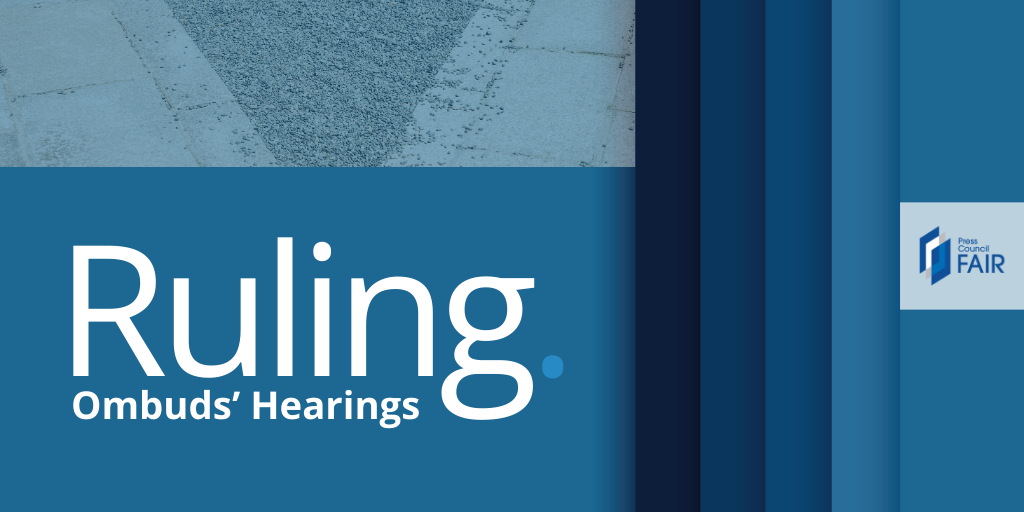Appeal Decision: SAPA vs Premier of the Western Cape
SUMMARY
This ruling by Press Ombud Johan Retief was based on the Press Code that was in effect before 30 September 2022.
Western Cape Premier Helen Zille complained about stories that had originated with Sapa and had been published on its news wire service, posted on Sapa’s Twitter account on 20 February 2015, and broadcast on several radio stations.
She complained that the articles falsely stated that she had made a racist statement.
The stories reported on events in the Western Cape Provincial Legislature on 20 February 2015, when Zille’s State of the Province Address was disrupted by ANC MPLs. Their disruption, by raising “points of order” for over three hours, resulted in the Speaker of the Provincial Legislature suspending proceedings twice and eventually adjourning the House. As a result, the Premier tabled, rather than delivered, her speech.
After having perused all the documentation that was provided to him, the Ombud said he was not convinced that Sapa had adequately and sufficiently corrected the mistake to which its editor had admitted. He directed Sapa to categorically state that it had made a mistake by accusing Zille of making a racist remark, and to apologise for the mistake.
Sapa then applied for leave to appeal.
Judge Ngoepe said he agreed with the reasons for the Ombuds ruling. He added that he differed with Sapa that the Ombud had been influenced by “the vehemence of the complainant’s case”. “In my view, imputing a racist remark especially to a Premier is a serious matter; in fact, in this country, accusing someone of racist remarks can have detrimental consequences to them, given our unfortunate history. These considerations must have weighed with the Ombudsman,” he opined.
The application for leave to appeal was dismissed.
THE RULING ITSELF
SAPA APPLICANT
versus
PREMIER OF THE WESTERN CAPE RESPONDENT
MATTER NO: 992/03/2015
DECISION: APPLICATION FOR LEAVE TO APPEAL
[1] The Premier of the Western Cape Hellen Zille (“respondent”) lodged a complaint against SAPA (“applicant”) against two articles which the applicant had published on 20 February 2015. The respondent says the first article was posted by the applicant at about 11h52: “ANC delays Zille’s state of province address”. The second one was posted in the afternoon at 15h37: “ANC Chief whip criticized the provincial legislature for changing its mind about how an alleged racist remark by Zille was to be dealt with”.
[2] The complaint was that both articles, which were widely distributed, were inaccurate as to what had actually happened in the House. There was never a point of order raised by the ANC in respect of alleged racist remarks by Zille; on the contrary, the alleged racist remark which was to be probed had been made by Fransman, the Leader of the Opposition in the Provincial House. Secondly, the respondent says the applicant was wrong to say the matter was to be referred to court; the agreement was to refer it to the Chief Justice for the latter to appoint a judge to adjudicate over the matter. The respondent points out that it was obvious from Hansard as to who was said to have made the alleged racist remark, namely, Fransman, and not Zille; respondent says the journalist was aware of this.
[3] It is common cause that the alleged racist remark was made by Fransman, not Zille. The applicant conceded that it had made the above mistake. It says it did try to correct the error as soon as it could. But the respondent retorted that applicant did not apologize; secondly, that it made an obscure correction. In particular, respondent says the supposed correction failed to report that, in fact, the Deputy Speaker had earlier ruled that what Fransman had said was racist. Respondent says the supposed correction persisted to attribute the alleged racist remark to the Premier.
[4] In his Ruling dated 24 March 2015, the Ombudsman found in favour of the respondent. He ruled, as had been argued by the respondent, that the applicant breached clause 2.1 of the Press Code (duty to report news “truthfully, accurately and fairly”); and clause 2.6 of the Code (“correcting inaccurate information etc”). The Ombudsman directed applicant “to state categorically that it made a mistake by accusing Zille of making a racist remark, and to apologize for the remark”. The applicant is now seeking leave to appeal the Ombudsman’s Ruling in its entirely.
[5] The Ombudsman has given his reasons for the Ruling; I agree with them. In its application for leave to appeal, the applicant contents, inter alia, that in concluding that the correction was not adequate, the Ombudsman had been influenced by “the vehemence of the complainant’s case”. I do not think so. In my view, imputing a racist remark especially to a Premier is a serious matter; in fact, in this country, accusing someone of racist remarks can have detrimental consequences to them, given our unfortunate history. These considerations must have weighed with the Ombudsman. Again, while it is true that applicant did not directly accuse the Premier of anything, it did refer to an alleged racist remark which it, incorrectly, attributed to the Premier. Applicant also argues that the Ruling would create a dangerous precedent by ordering an apology where a correction had been asked for, and effected. The truth of the matter is that the Ombudsman has made a finding that no adequate correction had been made. Finally, in coming to the light sanction he did, the Ombudsman had taken into consideration, including the fact that there was no malice, as well as other factors and challenges alluded to by the applicant in its application.
[6] For all the reasons given above, as well as those given by the Ombudsman, I am of the view that the applicant has no reasonable prospects of success before the Appeals Panel; the application is therefore dismissed.
Dated this 5th day of May 2015
Judge B M Ngoepe; Chair: Appeals Panel



